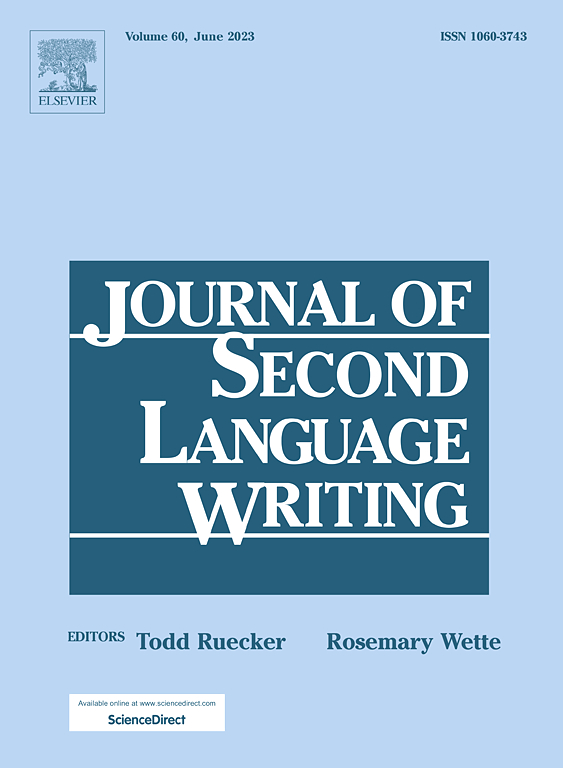Collaborative writing based on generative AI models: Revision and deliberation processes in German as a foreign language
IF 4.5
1区 文学
Q1 LINGUISTICS
引用次数: 0
Abstract
The introduction of generative AI (GenAI, e.g., ChatGPT) has transformed second language (L2) writing practices. Writers need to learn how to critically employ the tools’ affordances to maximise their learning and L2 instructors face the challenge of guiding students through these novel contexts (cf. Sasaki, 2023). Also collaborative writing (CW) interventions have to find ways how to include GenAI as another technology that impacts the effectiveness of CW as an instructional L2 writing tool (cf. Storch, 2022; Su et al., 2023). In this study, we present an in-depth analysis of how GenAI influences revision and deliberation processes during CW within four writing pairs (N = 8; aged 18–23) engaging in a classroom-based intervention that tasked them to compare their own writing with GenAI models. We analysed screen recordings of evolving revision behaviours, changes in text quality as well as joint discussions among pairs. Complementing Strobl, Menke-Bazhutkina, Abel, and Michel (2024), the current paper (i) relates writers’ revision behaviour to text quality evaluated for functional adequacy (Kuiken & Vedder, 2017); and (ii) presents a fine-grained review of dialogues to identify patterns of CW revisions in interaction with GenAI models. Findings shed new light on CW models (Storch, 2009) in the digital era where GenAI is implemented in L2 writing and revision instruction.
基于生成人工智能模型的协作写作:德语作为外语的修订和审议过程
生成式人工智能(GenAI,例如ChatGPT)的引入已经改变了第二语言(L2)的写作实践。作者需要学习如何批判性地使用工具的功能,以最大限度地提高他们的学习效果,第二语言教师面临着引导学生通过这些新环境的挑战(参见Sasaki, 2023)。此外,协作写作(CW)干预措施必须找到方法,将GenAI作为另一种影响协作写作作为第二语言教学写作工具有效性的技术(参见Storch, 2022;苏等人,2023)。在本研究中,我们深入分析了GenAI如何在四个写作对中影响CW的修订和审议过程(N = 8;(18-23岁)参与了一项以课堂为基础的干预活动,任务是让他们将自己的写作与GenAI模型进行比较。我们分析了不断变化的复习行为的屏幕记录,文本质量的变化以及成对之间的联合讨论。作为strobel, Menke-Bazhutkina, Abel和Michel(2024)的补充,当前的论文(i)将作者的修改行为与功能充充性评估的文本质量联系起来(Kuiken &;Vedder说,2017);(ii)对对话进行细粒度的回顾,以确定与GenAI模型相互作用的CW修订模式。研究结果揭示了数字时代的CW模型(Storch, 2009),在这个时代,GenAI在第二语言写作和复习教学中得到了实施。
本文章由计算机程序翻译,如有差异,请以英文原文为准。
求助全文
约1分钟内获得全文
求助全文
来源期刊

Journal of Second Language Writing
LINGUISTICS-
CiteScore
8.80
自引率
13.10%
发文量
50
审稿时长
59 days
期刊介绍:
The Journal of Second Language Writing is devoted to publishing theoretically grounded reports of research and discussions that represent a significant contribution to current understandings of central issues in second and foreign language writing and writing instruction. Some areas of interest are personal characteristics and attitudes of L2 writers, L2 writers'' composing processes, features of L2 writers'' texts, readers'' responses to L2 writing, assessment/evaluation of L2 writing, contexts (cultural, social, political, institutional) for L2 writing, and any other topic clearly relevant to L2 writing theory, research, or instruction.
 求助内容:
求助内容: 应助结果提醒方式:
应助结果提醒方式:


